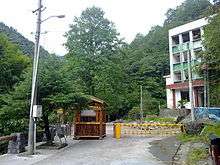Wuyanling National Nature Reserve
| Wuyanling National Nature Reserve | |
|---|---|
|
IUCN category V (protected landscape/seascape) | |
|
| |
 | |
| Location | Zhejiang, China |
| Nearest city | Wenzhou |
| Coordinates | 27°42′22″N 119°40′30″E / 27.706°N 119.675°ECoordinates: 27°42′22″N 119°40′30″E / 27.706°N 119.675°E |
| Area | 190.26km2 |
| Established | 1975 |
|
www | |
Wuyanling National Nature Reserve (Chinese: 乌岩岭; pinyin: wùyánlǐng; literally: "Black rocks ridge") is a nature reserve in Taishun County, in the southern part of Zhejiang Province. The reserve occupies a mountainous, forested area. The highest peak is Baiyun Peak, which is 1,611 metres (5,285 ft) high.[1]
Wildlife
BirdLife International considers Wuyanling Reserve as an Important Bird Area (IBA).[2] Birds of particular conservation value in the reserve include Cabot's tragopan, much studied in the reserve,[3] and Elliot's pheasant.[2]
A freshwater goby, Rhinogobius wuyanlingensis, has been collected from Wuyanling, described as a new species to science, and named after the reserve.[4]
The reserve's inhabitants also include the Chinese giant salamander. A specimen weighing 3.5 kg (7.7 lb), the largest one for a while, was observed in September 2012. This species, once common in the reserve, has greatly suffered from poaching.[5]

Tourism
A small part of the reserve is developed as a touristic area; the rest of the park is not accessible to the general public. The network of trails follows two streams,[6] and since 2012, includes a paved path to the Baiyun Peak.[7] In 2012, the scenic area was rated as a 3A touristic attraction.[8]
Baiyun Peak
At 1,611 metres (5,285 ft), the Baiyun Peak (Baiyunjian, Chinese: 白云尖; pinyin: báiyúnjiān; literally: "White cloud peak") is the highest mountain in Wenzhou.[9] A paved path now leads to the top.[7]
References
- ↑ Wuyanling National Nature Reserve Official page (in Chinese)
- 1 2 BirdLife International (2012). "Important Bird Areas factsheet: Wuyanling Nature Reserve". Retrieved 23 March 2012.
- ↑ Zhang, Y.; Zheng, G. (2007). "A population viability analysis (PVA) for Cabot's Tragopan (Tragopan caboti) in Wuyanling, south-east China". Bird Conservation International. 17 (2): 151–161. doi:10.1017/S0959270907000652. See Table 1 and references therein.
- ↑ Yang, J. Q.; Wu, H. L.; Chen, I. S. (2008). "A new species of Rhinogobius (Teleostei: Gobiidae) from the Feiyunjiang Basin in Zhejiang Province, China". Ichthyological Research. 55 (4): 379–385. doi:10.1007/s10228-008-0076-8.
- ↑ "乌岩岭发现3.5公斤娃娃鱼 ("Giant salamander weighing 3.5 kg found in Wuyanling")". Zhejiang Province Wuyanling National Nature Reserve. 2012. Retrieved 24 March 2013.
- ↑ "乌岩岭导游图 ("Wuyanling tour map")". Zhejiang Province Wuyanling National Nature Reserve. 2012. Retrieved 14 August 2013.
- 1 2 "乌岩岭游步道修到白云尖 ("Wuyanling tourist trail built to Baiyun Peak")". Zhejiang Province Wuyanling National Nature Reserve. 2012. Retrieved 14 August 2013.
- ↑ "乌岩岭通过国家AAA级景区评定验收 ("Wuyanling assessed through the national AAA level scenic acceptance")". Zhejiang Province Wuyanling National Nature Reserve. 2012. Retrieved 14 August 2013.
- ↑ "白云尖 ("Baiyun Peak")". Zhejiang Province Wuyanling National Nature Reserve. 2008. Retrieved 14 August 2013.
External links
- Wuyanling National Nature Reserve official page (in Chinese)
- Wuyanling Nature Reserve protectedplanet.net
- Wuyanling National Nature Reserve TravelChinaGuide.com